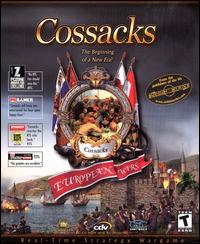Cossacks: European Wars
| Cossacks: European Wars | |
|---|---|
 |
|
| Developer(s) | GSC Game World |
| Publisher(s) | CDV Software Entertainment |
| Series | Cossacks |
| Platform(s) | Microsoft Windows |
| Release |
|
| Genre(s) | Real-time strategy |
| Mode(s) | Single-player, multiplayer |
| Aggregate scores | |
|---|---|
| Aggregator | Score |
| GameRankings | 78% |
| Metacritic | 74/100 |
| Review scores | |
| Publication | Score |
| Eurogamer | 8/10 |
| GameSpot | 7.1/10 |
| IGN | 7.5/10 |
| PC Zone | 8.9/10 |
| ESC Magazine | 9/10 |
Cossacks: European Wars is a real-time strategy video game for Microsoft Windows made by the Ukrainian developer GSC Game World. It was released on 24 April 2001. The game has an isometric view and is set in the 17th and 18th centuries of Europe. It features sixteen playable nations each with its own architectural styles, technologies and units.
Players must avoid famine and engage in army expansion, building construction and simple resource gathering. Mission scenarios range from conflicts such as Thirty Years' War to the War of the Austrian Succession, and the game is renowned for the seemingly unlimited number of units players may control. This ability set it apart from other games of the time such as Age of Empires and Empire Earth.
Cossacks is a game which allows the user to gain strategy skills and even pick up some relative history of that period by the inclusion of a comprehensive encyclopedia. This top selling title has won two awards and was positively favoured by a majority of reviewers.
There are 6 basic resources in the game that are crucial to the player's military victory. These are gold, wood, food, stone, iron and coal. Gold, iron and coal may only be acquired by constructing mines over a designated resource area and sending peasants into them whereas food is cultivated from mills and via the use of fishing boats. Wood and stone are gathered by conventional means and there are also specific areas where these may be collected. Depending on the type of unit or structure being built, the amount of resources needed to create a unit/structure would inflate quantitatively with each successive one built or trained. Depleted resources would result in an undesirable penalty for the player such as a lack of food will signify a famine for the state and the player's units will die from lack of supplies. Similarly, a lack of coal and iron means that shooters and cannons will cease to fire their weapons whereas a lack of gold will mean that units which require maintenance paid will commit mutiny against the state. The economic workforce consists of peasants who can multitask and also attack enemy soldiers. They can, however, also be captured by enemy troops and turned to the enemy's allegiance.
...
Wikipedia
